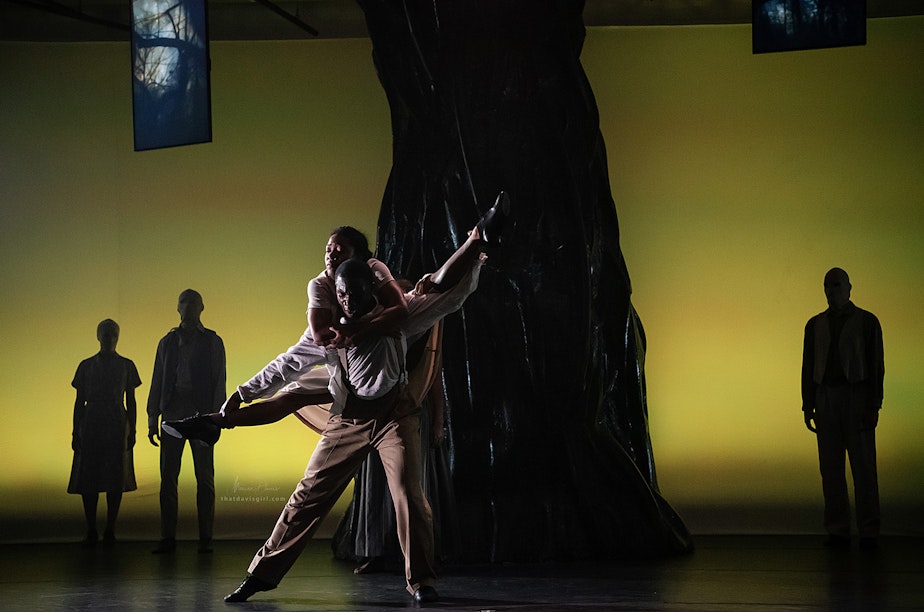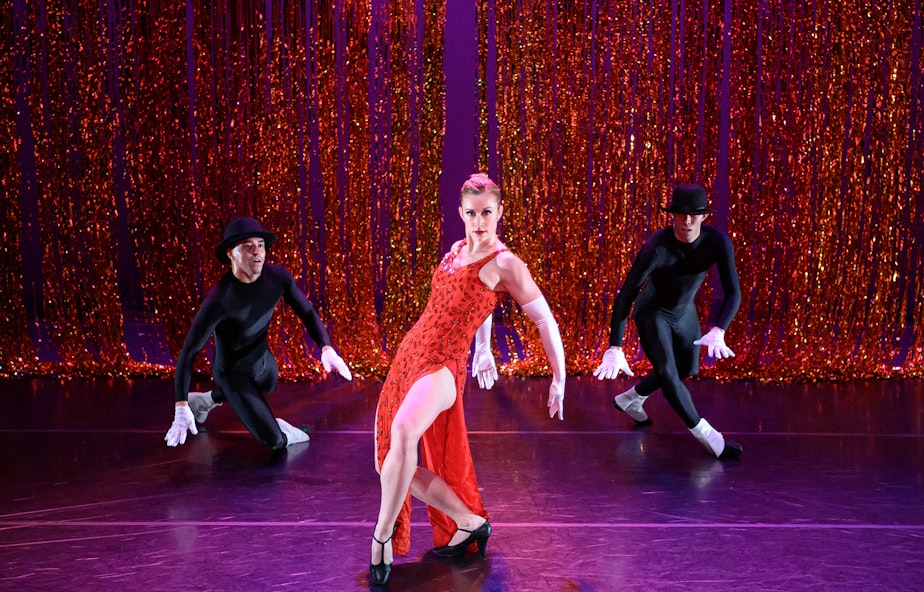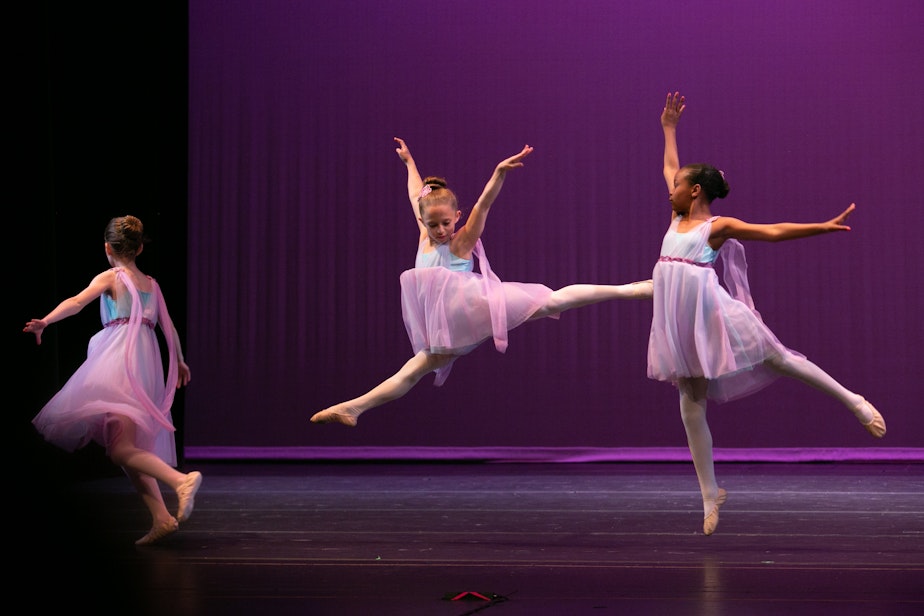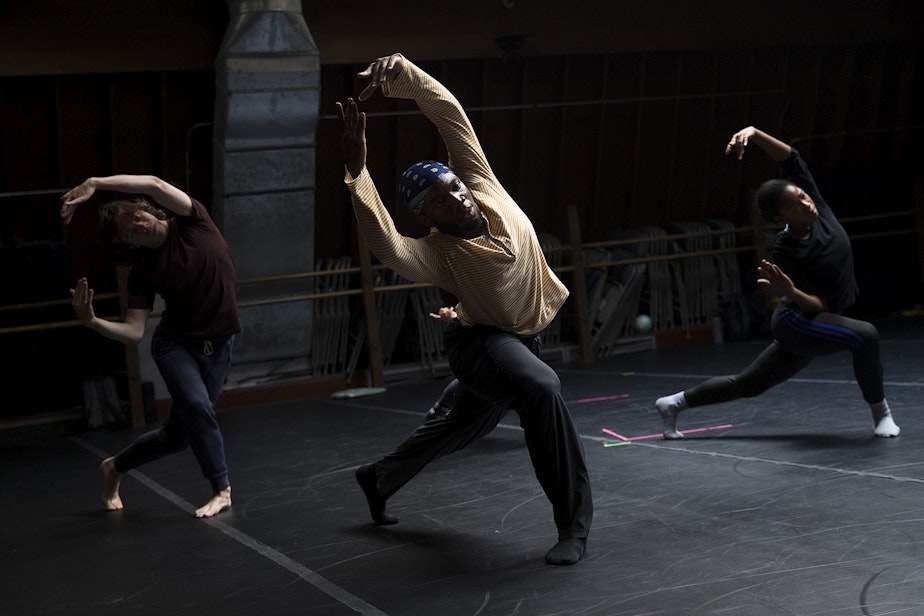Dance is 'close and sweaty,' but Donald Byrd re-imagines it for the pandemic age

Donald Byrd, artistic director at Seattle’s Spectrum Dance Theatre, and his company members were working on a new dance about the intersection of race and climate change in early March.
The performance was scheduled to premiere in April. While coronavirus cases were on the rise locally, officials hadn’t yet issued any public gathering restrictions. So Byrd and his dancers continued rehearsals at their studio at Madrona Beach.
But they were leery about the highly contagious virus, according to dancer Jaclyn Wheatley.
“Dance being such a physical art form, close and sweaty, it didn’t seem like it was possible for us to continue,” she says.

On March 15, one week before Governor Jay Inslee’s public gathering ban was to take effect, Byrd and Spectrum’s Executive Director Tera Beach shut down operations.
They believed it was the right decision to safeguard the health and safety of their employees. But, like so many other arts organizations, they had no idea how, or even if, Spectrum could survive an extended shutdown.
Sponsored
Five months later, with the coronavirus still ravaging the country, most performing arts groups are resigned to the fact that live performances won’t resume until January 2021 at the earliest. It’s even scarier because nobody can say how long it will be until a vaccine is available.
The prolonged closure threatens not only Spectrum’s financial health, but also the company’s mission to address racial and social inequities through both its artistic productions and its popular school, which provides about a third of Spectrum’s revenue.
Beach, charged with finding the money to keep Spectrum afloat, says the prospect of a months-long closure induced “absolute panic” in March. Five months later, she worries about paying her staff, and losing the tight-knit community Spectrum has forged. She and Byrd are determined to use new technologies to tackle both of those challenges.
This spring, Spectrum’s popular dance classes moved online.

Sponsored
An anonymous donor contributed enough money to allow the organization to offer free instruction for everyone. But students without access to computers or good internet connections were left behind, according to Wheatley. In addition to dancing with the company, Wheatley taught ballet and jazz classes at Spectrum since 2015.
“There’s a huge percentage of our school population at Spectrum that just didn’t have the opportunity,” Wheatley said. “Whether it’s internet access or devices or space to dance at home.”
Both she and Byrd say the students who can access online instruction simply aren’t thrilled with Zoom classes, especially when they’re likely to be attending school online this autumn. Beach has surveyed families to find out how they’d feel about a hybrid of in studio/online learning. Meanwhile, she and Byrd are just as eager to come up with new digital strategies for Spectrum’s artistic content.

Sponsored
In the wake of the huge, and on-going, racial justice uprising following George Floyd’s death at the hands of Minneapolis police, Byrd’s focus on social justice has become even more relevant to the national conversation. To that end, in early June, Spectrum decided to stream two archival performance videos: “Shot,” about police brutality against Black men in particular, and last year’s “Strange Fruit,” which addresses lynching.
But Byrd isn’t content simply to mine Spectrum’s vault. He’s driven to make new work, and he believes the pandemic opens the door to imagine dance beyond live performance in a theater setting.
“There were a lot of things about the way we did things before that didn’t necessarily always work,” Byrd says. “We have the opportunity to do something different.”
For example, instead of traditional collaborations with sound, set and costume designers, Byrd envisions working with experts in Seattle’s video game and virtual reality sectors to create work specifically for digital platforms. He also expects to present more outdoor performances; if he can bring his dancers into the studio later this summer, he’d like to rehearse and present the show originally scheduled for April on the beach outside Spectrum’s headquarters.
Spectrum dancer Jaclyn Wheatley says if they can come back safely, she’s ready to be back in the studio with her colleagues.
Sponsored
“I have been grieving the chance to dance everyday,” she says.
Despite the virus, Byrd isn’t ready to abandon live performance. He’s teamed up with local architects to design a safe, socially-distanced theater he’d like to build in an abandoned airplane hangar at Magnuson Park. Spectrum executive director Beach says Byrd’s ideas are thrilling…and daunting.
“How do we afford to do these things that are new and innovative and exciting?” she says.
Beach has talked with other local arts leaders who wonder the same thing.
Stop-gap emergency government and private sector grants helped plug some of their immediate budgetary holes this spring, but those funds were finite. Some arts groups won’t be able to survive the long-term public closures. “I think the arts community really needs to rally together like the airline or banking industry,” Beach says, “and seek some kind of bailout.”
Sponsored
She concedes that’s unlikely, given the current administration. And while some in the arts community advocate a reinvention of Roosevelt’s Great Depression-era Works Progress Administration, which included a significant arts program, lawmakers haven’t taken up that gauntlet.
Donald Byrd has no patience to sit around and wait for other people to address the challenges he and other artists face. “I mean, I wake up some mornings and I have like five minutes when I sit there and go ‘Do I break down and start crying?’”
But Byrd says his despair is momentary. “No, I go ‘drink some coffee, then get to work!’”
We'd like to hear from you!
We're always looking for community ideas, and now we have a new way for you to contribute: by text! If you join our Community Feedback Club, we'll send you periodic texts (no more than once a week) asking for simple feedback on stories, and story ideas.
To join, text the word "club" to (206) 926-9955.




